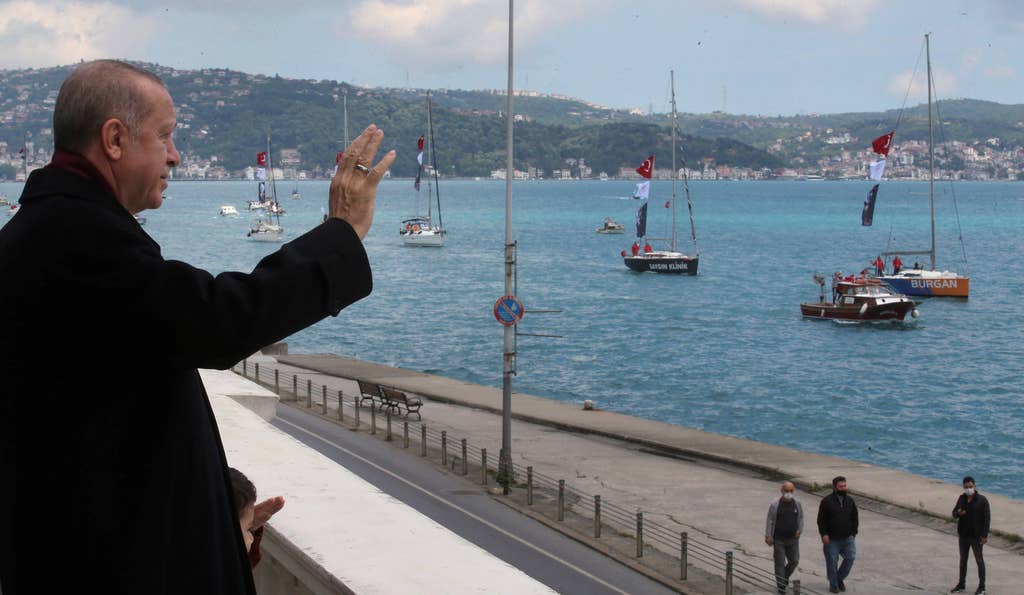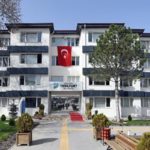In 2010, Deputy Foreign Minister Danny Ayalon unleashed a storm when, in a meeting, he had Turkish Ambassador Ahmet Oguz Celikkol sit on a low chair – and made sure the photographers were snapping. The next month, the ambassador left Israel. Three months later, Israel’s botched raid on a Turkish flotilla to Gaza all but severed Turkish-Israeli relations.
A different game of chairs was played this month when President Recep Tayyip Erdogan met in his luxurious palace with the president of the European Council, Charles Michel, and the president of the European Commission, Ursula von der Leyen. Planned weeks in advance, this was supposed to be a critical meeting on issues that have caused great tension between the European Union and Turkey.
But it was a farce from the start. Erdogan and Michel strode slowly toward the two elegant chairs prepared for them, sat down and watched as von der Leyen looked around for a chair. The commissioner said “uhm,” shrugged and sat on a nearby sofa. Neither of the men bothered to get up and hunt down a chair for her or offer his own.- Advertisment –
Photos of this offensive performance went viral, and Italian Prime Minister Mario Draghi called Erdogan a dictator. The European Commission condemned Michel as well as Erdogan. Turkish Foreign Minister Mevlut Cavusoglu said the seating arrangements followed the protocol agreed on with the commission – a claim the commission vehemently denied.
Ostensibly this was just another sideshow in the war of insults between the EU and Erdogan, but when Brussels is threatening to impose sanctions on Turkey for a number of reasons, Erdogan would be expected to try to mollify EU opinion rather than play a disgraceful game of musical chairs.
Erdogan, however, has long understood that he can act as he pleases toward Europe and still win. For more than six months, the EU has been debating how to respond to Turkey’s oil and gas drilling in Mediterranean waters where Greece claims ownership. Warnings, threats and even reconciliation talks have all been in vain. – Advertisment –
Decisions are put off from one EU summit to the next; the divisions among EU countries are deep. Even the inauguration of a new U.S. president and his support for Europe’s demands haven’t gotten the EU to decide, lest Erdogan respond to any sanctions by flooding Europe with refugees.
Russian tourists canceling
Erdogan would never dare play musical chairs with Russia. But after Erdogan met last week with Ukrainian President Volodymyr Zelensky, he said Turkey stands with the Ukrainian people, opposes Russia’s annexation of the Crimea and seeks peace for the region. There were even reports that Ankara might sell Ukraine Turkish-made drones. – Advertisment –
Russia, which has moved its forces closer to the Ukrainian border, viewed these statements as a threat and responded swiftly. It ordered commercial flights between Russia and Turkey cut to two a week until mid-June, allegedly due to a new outbreak of the coronavirus. More than half a million tourists, a key revenue source for the Turkish tourism industry, will have to cancel.
Russia made clear previously that Turkey isn’t a “strategic ally,” just a “close friend.” And its latest moves reminded Turks of the harsh sanctions it imposed on the Turkish economy in 2015 after Turkey downed a Russian fighter jet near the Turkish-Syrian border.
Turkey’s embrace of Ukraine isn’t the main reason for Moscow’s concern. Erdogan’s dream of building a canal connecting the Black Sea with the Sea of Marmara, which Istanbul overlooks, is a huge land mine. If this dream comes true, it could shake up the region.
The project, known as the Istanbul Canal, was dreamed up in the 1990s, mainly due to the enormous volume of maritime traffic through the Bosporus Strait. Today, too, Erdogan is offering economic reasons for the plan. His experts say an increase in traffic through a canal would reap the country tens of billions of dollars a year. It would also provide the Turkish people, who are suffering 13 percent unemployment, with tens of thousands of new manufacturing and service jobs in businesses sprouting up along the canal.
There have also been reports that tycoons and relatives of Erdogan have bought land near the canal’s route.
But it’s not the plan’s economic aspects that are bothering Russia, Brussels and the countries bordering the Black Sea. Traffic through the Bosporus is governed by the 1936 Montreux Convention, which governs details such as the amounts of cargo and types of ships allowed through.
Instead, Turkey would have sole authority to govern the traffic and cargo passing through. It would be able to permit the passage of warships from the Mediterranean to the Black Sea.
This development is ostensibly good news for the United States, which, for the right price, would be able to send its warships into the Black Sea if war broke out with Russia. But Washington would undoubtedly have to make major concessions to Turkey, like abandoning its campaign against Turkey’s acquisition of S-400 anti-aircraft systems from Moscow. Joe Biden would also have to ignore Turkish human rights violations and let Erdogan do as he wishes against the Kurds.
Still, even if Biden viewed the canal as a strategic asset for the West, he would discover that the Chinese beat him to the punch. China expressed interest in the canal in 2011, before plans were even on paper. According to Turkish media reports, Chinese companies plan to submit four bids to build the project. The Bank of China is expected to underwrite much of the construction, and Erdogan often meets with Chinese officials bringing tempting offers.
Partly as compensation to China, Turkey is keeping quiet about the oppression of China’s Uighur minority. Erdogan’s Justice and Development Party has thwarted an opposition bill to establish a parliamentary committee to investigate China’s crimes against humanity against the Uighurs.
Thaw with Egypt
Erdogan himself has called the canal his “crazy project.” These plans remain controversial, especially when Turkey is suffering one of its worst economic crises in a generation and is facing a fourth coronavirus wave averaging over 56,000 new cases a day.
But when he attacked the opposition for opposing the canal plan, Erdogan signaled his ambition to turn Turkey into a regional power that will make both Russia and the United States dependent on it. “They’re trying to prevent the project, but despite their objections, we’ll build the Istanbul Canal,” he declared. Still, Erdogan is awaiting that first phone call from Biden.
Meanwhile, Erdogan is trying to improve his hand against Washington with his efforts to revive diplomatic ties with Egypt and Israel. Egyptian Foreign Minister Sameh Shoukry and his Turkish counterpart, Mevlut Cavusoglu, spoke last month in the first such high-level talks in years. The two will meet next month if Turkey meets Egypt’s conditions, among them halting criticism of Egypt in television broadcasts by the Muslim Brotherhood and extraditing to Egypt people suspected of opposing the regime of Egyptian President Abdel-Fattah al-Sissi.
Erdogan’s megalomania knows no bounds, and anyone who stands in his way better watch out. At least that’s what 104 ex-admirals and other former navy chiefs learned after writing an open letter this month, where they said “the Montreux Convention is an important document for Turkey’s security and sovereignty, and it should not be made a controversial matter.”
They wanted Erdogan to back off the Istanbul Canal idea, which could put Turkey at the center of an international dispute. Turkey arrested 10 admirals (who were later released), charging some of them with “conspiracy to revolution,” no less.
Just as Erdogan learned his chair trick from Ayalon, it seems he’s copying from Israel the method of using wars to distract people from real problems. Some Turkish and Western analysts believe that the Istanbul Canal is meant to bolster Erdogan’s image as a leader who can beat the EU, Russia and the United States, no matter what the combination.
Their analysis is bolstered by the latest polls, which show support for the ruling party at less than 30 percent. While the presidential election is only due in 2023, Erdogan has to shore up his standing for his day-to-day rule.
As part of this effort, Erdogan and his party are working in parliament to eliminate the pro-Kurdish HDP before the next election by arresting its members and demanding that their parliamentary immunity be lifted.
The government is trying to distract people from the meteoric price rises with populist means like free potatoes and onions for the needy. Health Minister Fahrettin Koca responded to the coronavirus crisis by praising the Chinese vaccine. But fewer than 12 million of the country’s 80 million people have been vaccinated; inoculation of the over-40s is planned to be completed by June.
Turkey’s vaccine shortage and failures in distributing it accompany the spiking infection rates. Meanwhile, Erdogan pledged to send 150,000 doses to Libya. All these problems are supposed to magically disappear in the waters of the Istanbul Canal.
By: Zvi Bar’el
Source: Haaretz



